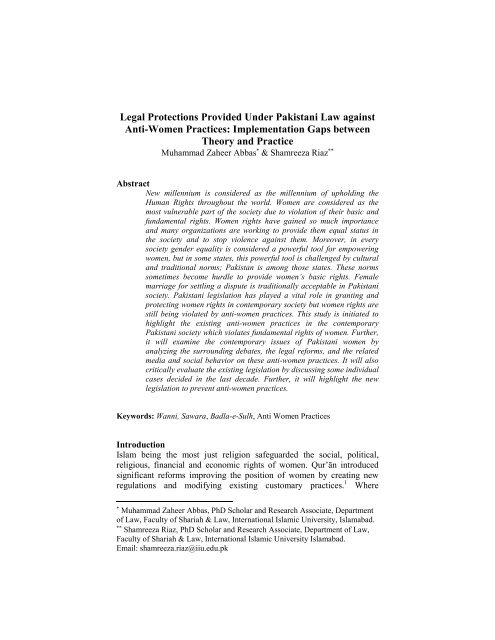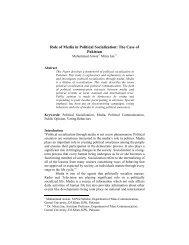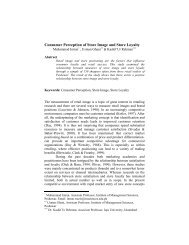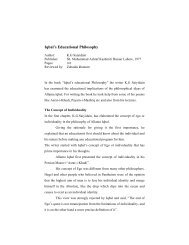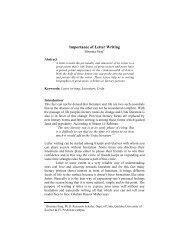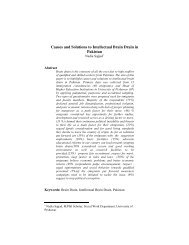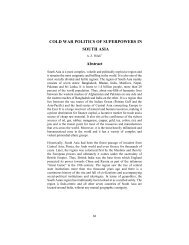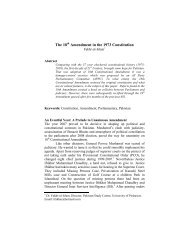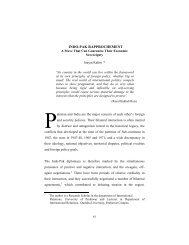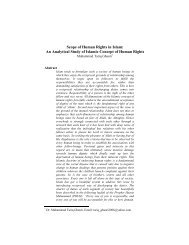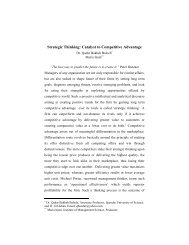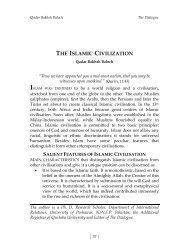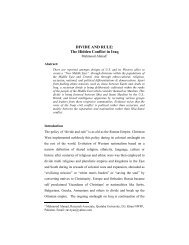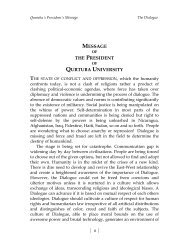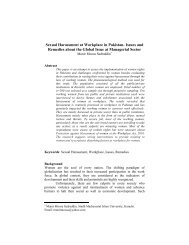Implementation Gaps between Theory and Practice
Implementation Gaps between Theory and Practice
Implementation Gaps between Theory and Practice
You also want an ePaper? Increase the reach of your titles
YUMPU automatically turns print PDFs into web optimized ePapers that Google loves.
Legal Protections Provided Under Pakistani Law against<br />
Anti-Women <strong>Practice</strong>s: <strong>Implementation</strong> <strong>Gaps</strong> <strong>between</strong><br />
<strong>Theory</strong> <strong>and</strong> <strong>Practice</strong><br />
Muhammad Zaheer Abbas ∗ & Shamreeza Riaz ∗∗<br />
Abstract<br />
New millennium is considered as the millennium of upholding the<br />
Human Rights throughout the world. Women are considered as the<br />
most vulnerable part of the society due to violation of their basic <strong>and</strong><br />
fundamental rights. Women rights have gained so much importance<br />
<strong>and</strong> many organizations are working to provide them equal status in<br />
the society <strong>and</strong> to stop violence against them. Moreover, in every<br />
society gender equality is considered a powerful tool for empowering<br />
women, but in some states, this powerful tool is challenged by cultural<br />
<strong>and</strong> traditional norms; Pakistan is among those states. These norms<br />
sometimes become hurdle to provide women’s basic rights. Female<br />
marriage for settling a dispute is traditionally acceptable in Pakistani<br />
society. Pakistani legislation has played a vital role in granting <strong>and</strong><br />
protecting women rights in contemporary society but women rights are<br />
still being violated by anti-women practices. This study is initiated to<br />
highlight the existing anti-women practices in the contemporary<br />
Pakistani society which violates fundamental rights of women. Further,<br />
it will examine the contemporary issues of Pakistani women by<br />
analyzing the surrounding debates, the legal reforms, <strong>and</strong> the related<br />
media <strong>and</strong> social behavior on these anti-women practices. It will also<br />
critically evaluate the existing legislation by discussing some individual<br />
cases decided in the last decade. Further, it will highlight the new<br />
legislation to prevent anti-women practices.<br />
Keywords: Wanni, Sawara, Badla-e-Sulh, Anti Women <strong>Practice</strong>s<br />
Introduction<br />
Islam being the most just religion safeguarded the social, political,<br />
religious, financial <strong>and</strong> economic rights of women. Qur’ān introduced<br />
significant reforms improving the position of women by creating new<br />
regulations <strong>and</strong> modifying existing customary practices. 1 Where<br />
∗ Muhammad Zaheer Abbas, PhD Scholar <strong>and</strong> Research Associate, Department<br />
of Law, Faculty of Shariah & Law, International Islamic University, Islamabad.<br />
∗∗ Shamreeza Riaz, PhD Scholar <strong>and</strong> Research Associate, Department of Law,<br />
Faculty of Shariah & Law, International Islamic University Islamabad.<br />
Email: shamreeza.riaz@iiu.edu.pk
Legal Protections Provided Under Pakistani Law against<br />
Anti-Women <strong>Practice</strong>s: <strong>Implementation</strong> <strong>Gaps</strong> <strong>between</strong> <strong>Theory</strong> <strong>and</strong> <strong>Practice</strong><br />
Zaheer & Shamreeza<br />
Qur’ānic reforms <strong>and</strong> values were integrated, they practiced to raise the<br />
status of women <strong>and</strong> the family in the Muslim society by establishing the<br />
rights of family members. 2 After the advent of Islam, women were<br />
granted the right of marriage, education, inheritance, dower, divorce,<br />
work <strong>and</strong> various other rights. Islam came to correct misconceptions,<br />
implement justice <strong>and</strong> women’s dignity. 3<br />
Islam gave women dignity <strong>and</strong> raised their position in society as<br />
human beings who contribute to the building of their society. It also<br />
focused that women are the essential part of the society <strong>and</strong> they work<br />
for the development <strong>and</strong> prosperity of nations. Islam gave women<br />
security which they needed from centuries <strong>and</strong> still lacked in various so<br />
called civilized societies. 4<br />
Allah (SWT) has dignified the whole mankind, regardless of<br />
whether male or female. He says:<br />
“And indeed we have honored the children of Adam, <strong>and</strong> we have<br />
carried them on l<strong>and</strong> <strong>and</strong> sea, <strong>and</strong> have provided them with good<br />
things, <strong>and</strong> have preferred them above many of those whom We have<br />
created with a marked preferment.” 5<br />
Islam provided rights to women in every field of life. Reforms<br />
introduced by the Qur’ān improved the position of women by creating<br />
new regulations <strong>and</strong> modifying existing customary practices. 6 Muslim<br />
women have been granted most prestigious status by Islam, however, the<br />
rights granted by Shariah are not fully enjoyed by women even in<br />
Islamic states due to societal limitations such as lack of awareness of true<br />
Islamic principles, male dominance, prevalent customs <strong>and</strong> traditions,<br />
thus leading to gaps <strong>between</strong> theory <strong>and</strong> practice of Islamic teachings.<br />
In Pakistani society, where women comprise half of population,<br />
many fundamental rights of women are violated at gross level. These<br />
rights include, right to life, right to safety, right of marriage with free<br />
consent <strong>and</strong> right of inheritance, which are violated by practicing<br />
existing customs of Sawara, 7 Wanni 8 <strong>and</strong> Badla-e-Sulh. 9 Not only Islam<br />
but also Constitution of Pakistan has bestowed women rights as equal to<br />
men; however, these rights are violated by society.<br />
This article will highlight the existing malpractices <strong>and</strong> state’s<br />
reforms to prevent anti-women practices. To have a deeper<br />
underst<strong>and</strong>ing of the issue, these questions will be addressed in this<br />
work. Does Islam <strong>and</strong> Pakistani legal system allow a female marriage for<br />
settling a dispute? Whether state has taken measures to prevent antiwomen<br />
practices from society? Are anti-women practices only practiced<br />
in Pakistan? What are the misunderst<strong>and</strong>ings <strong>and</strong> malpractices prevalent<br />
in the contemporary Pakistani society concerning the issue? Is there any<br />
legislation concerning the issue in Pakistan? Is there any gap in<br />
The Dialogue 173<br />
Volume VIII Number 2
Legal Protections Provided Under Pakistani Law against<br />
Anti-Women <strong>Practice</strong>s: <strong>Implementation</strong> <strong>Gaps</strong> <strong>between</strong> <strong>Theory</strong> <strong>and</strong> <strong>Practice</strong><br />
Zaheer & Shamreeza<br />
implementation of legislation concerning the issue? Is there a need to<br />
improve the law to prevent anti-women practices?<br />
Answer to these questions set forth will be explored in the light<br />
of existing practices <strong>and</strong> legal provisions, which protect women rights.<br />
The article will also bring into focus the social attitudes <strong>and</strong> behavior<br />
patterns towards the issue. However, to address the issue statistical data<br />
is collected from Amnesty International, Aurut Foundation, <strong>and</strong> ten years<br />
annual reports of Human Rights Commission (hereinafter used as HRC).<br />
Badla-e-Sulh/Wanni/Sawara<br />
In feudal <strong>and</strong> tribal areas of Pakistan, women are a vulnerable group <strong>and</strong><br />
their rights are often curtailed by their male family members; their rights<br />
normally ignored by the society. Many anti-women practices are<br />
prevalent in Pakistani society <strong>and</strong> women are subjugated under antiwomen<br />
practices. Female marriage for settling a dispute violates<br />
women’s right to freedom, right to life, <strong>and</strong> right of marriage with free<br />
consent. It is against the very core purpose of marriage contract. In<br />
feudal <strong>and</strong> tribal areas of Pakistan, where there is no provision of law,<br />
many cultural <strong>and</strong> tribal practices are prevalent. In these areas many<br />
minor girls are given as compensation, to settle a matter of blood feud or<br />
matters of honor finance.<br />
A punchayat or jirga decides to h<strong>and</strong> over a minor girl as<br />
compensation to rival families. She is considered as commodity against<br />
blood money or loan. This practice of giving girl as compensation is<br />
common in all provinces of Pakistan with different names. It is called<br />
‘Sawara’ in K.P.K, ‘Irjaee’ in Balochistan, ‘Sung-Chatti’ in Sindh <strong>and</strong><br />
‘Wanni’ in Punjab. 10 Despite the fact that giving of girls as ‘Badla-e-<br />
Sulh’ or compensation is not allowed in Islam, the general perception<br />
among people practicing this custom is that it has religious sanction since<br />
the intention is 'to bring peace' among warring parties. 11<br />
This practice not only encourages crime <strong>and</strong> violence as the<br />
perpetrator of the crime goes unpunished, but also is extremely unjust to<br />
the minor girls who have to live with the stigma <strong>and</strong> humiliation all their<br />
lives for a crime they never committed. 12<br />
Definition <strong>and</strong> Theoretical Concept<br />
Basically, the term Badla-e-Sulhmeans giving a female in marriage<br />
contract or otherwise compelling her for marriage as a reconciliation of a<br />
family dispute. 13 Wanni is a child marriage custom in tribal areas of<br />
Pakistan. Besides tribal areas, it is widely followed in Punjab.<br />
“This custom is tied to blood feuds among the different tribes <strong>and</strong> clans<br />
where the young girls are forcibly married to the members of different<br />
clans in order to resolve the feuds. The Wanni could be avoided if the<br />
The Dialogue 174<br />
Volume VIII Number 2
Legal Protections Provided Under Pakistani Law against<br />
Anti-Women <strong>Practice</strong>s: <strong>Implementation</strong> <strong>Gaps</strong> <strong>between</strong> <strong>Theory</strong> <strong>and</strong> <strong>Practice</strong><br />
Zaheer & Shamreeza<br />
clan of the girl agrees to pay money called Diyat. Otherwise the young<br />
bride may spend her life paying for the crime of her male relatives.” 14<br />
However, the term Sawara is a Pashto word denoting a child marriage<br />
custom in tribal areas of Pakistan <strong>and</strong> Afghanistan. This custom is tied to<br />
blood feuds among the different tribes <strong>and</strong> clans where the young girls<br />
are forcibly married to the members of different clans in order to resolve<br />
the feuds 15 . Moreover, by following these practices, women from one<br />
family are given away to the male members of their rival’s family as<br />
‘compensation’ 16 . Though cruel, it is culturally sanctioned practice where<br />
girls are given in marriage as a form of dispute resolution.<br />
Basically, these traditions exist in Pakistan’s rural communities,<br />
sanctioned <strong>and</strong> prescribed by a Jirga, or Punchayat. 17 These traditions<br />
are often confused with the religion. However, it is necessary to clarify<br />
Islamic point of view on marriage contract.<br />
Badlh-e-Sulh, Sawara <strong>and</strong> Wanni: In Context of Shariah<br />
Marriage <strong>and</strong> family institution occupies a very pivotal position in the<br />
legal system of Islam. 18 It can be judged from the fact that Muslim jurists<br />
regarded the protection of marriage among the five fundamental<br />
objectives of Shariah. The Qur’ān describes marriage as<br />
mithaqanghaliza. 19 Marriage in Islam is essentially a righteous act <strong>and</strong> an<br />
act of devotion (‘ibadah’). 20 Moreover, marriage is necessarily a civil<br />
contract; it has gained the same status as other contracts in society.<br />
However, it is not only a civil contract but also a sacred covenant 21<br />
(mithaq), which is having the sanctity of Shariah <strong>and</strong> pleasure of God. 22<br />
These objectives of marriage contract cannot be achieved by<br />
forcing a woman to enter into marriage contract as Badlh-e-Sulh, Wanni<br />
or Sawara. Such practices are against the Islamic provisions <strong>and</strong> rights<br />
granted by the Constitution of Pakistan. Hence, such practices are totally<br />
against Islamic injunctions <strong>and</strong> based on cultural <strong>and</strong> traditional norms.<br />
Legal Provisions<br />
Constitution of Pakistan provides legal guarantees to safeguard the rights<br />
of both genders without any discrimination under Articles 4, 8, 14, 25,<br />
26, 27, 34, 35, 37 <strong>and</strong> 38. The Constitution of Pakistan does not define<br />
term discrimination but it prohibits discrimination in all forms on the<br />
basis of gender. However, discrimination exists in male dominated<br />
society <strong>and</strong> women are forced to obey many tribal <strong>and</strong> traditional<br />
customs by their male family members.<br />
Women’s rights have been violated for last many decades by<br />
giving girls, most of time minor girls, as compensation for any blood<br />
money or honor finance to rival family. It not only promotes crime <strong>and</strong><br />
The Dialogue 175<br />
Volume VIII Number 2
Legal Protections Provided Under Pakistani Law against<br />
Anti-Women <strong>Practice</strong>s: <strong>Implementation</strong> <strong>Gaps</strong> <strong>between</strong> <strong>Theory</strong> <strong>and</strong> <strong>Practice</strong><br />
Zaheer & Shamreeza<br />
violence against women but also violates rights of child. There was no<br />
specific provision of law to deal with such crimes <strong>and</strong> these were in<br />
pipeline from ancient times. 23<br />
After the struggle of women rights activists <strong>and</strong> human rights<br />
organizations such as Amnesty International, Human Rights Watch,<br />
Human Rights Commission <strong>and</strong> Aurat Foundation, a new law was<br />
enacted as Criminal Law (amendment) Act 2004.<br />
In this Act, new provision of law was inserted in Pakistan Penal<br />
Code (PPC) to define such practices as crime. A new section 310A 24 was<br />
inserted which prohibits Badla-e-Sulh. Under this section, girl/woman<br />
cannot be given in marriage as compensation of someone’s crime or as<br />
financial honor. It directly deals with all forms of ‘marriage as<br />
compensation’ which is practiced all over Pakistan with different names<br />
such as Badla-e-Sulh, Sawara, Wanni, Sung-Chatti <strong>and</strong> Irjaee. After the<br />
enactment of new legislation, same ratio of cases was reported from 2005<br />
to 2011. This practice was persistent due to feudal <strong>and</strong> tribal system, as<br />
they have their own jirga system <strong>and</strong> they do not follow the provisions of<br />
law. Still there was a need to raise voice to protect rights of all those<br />
women who became victim of such practices.<br />
Different organizations such as Human Rights Commission,<br />
Amnesty International, Human Rights Watch <strong>and</strong> Aurat Foundation<br />
worked to collect statistical data on prevailing customs after the<br />
enactment of law. They continued efforts to prevent such practices by<br />
indicating individual cases <strong>and</strong> by struggling to amend existing laws.<br />
Here it will be beneficial to first discuss the individual cases over ten<br />
years, the nature of disputes, reasons behind the dispute <strong>and</strong> steps of<br />
government officials <strong>and</strong> legislative body to prevent such practices <strong>and</strong><br />
then to move forward towards recently passed law ‘Anti Women<br />
<strong>Practice</strong>s Act 2011’.<br />
Badlh-e-Sulh, Sawara <strong>and</strong> Wanni: Individual Cases in Over a<br />
Decade<br />
Anti-women practices are not a new phenomenon rather it has been<br />
practiced from pre-historic time till date. In Pakistan, anti-women<br />
practices are prevalent owing to gender biased decisions of jirga in all<br />
areas of Pakistan. Over last decade, nothing has changed practically<br />
except dates <strong>and</strong> titles of cases. Women are suffering from the same<br />
crimes of violence committed against them over <strong>and</strong> over again. The<br />
apathy of the political elite remains the same. The lack of underst<strong>and</strong>ing<br />
on part of women parliamentarians remains the same. If there has been<br />
any change, it is in the level of cruelty shown to women over a decade. 25<br />
It is a threat to the basic rights of woman, who is subjugated in<br />
society due to different forms of violence. The reasons for denying<br />
The Dialogue 176<br />
Volume VIII Number 2
Legal Protections Provided Under Pakistani Law against<br />
Anti-Women <strong>Practice</strong>s: <strong>Implementation</strong> <strong>Gaps</strong> <strong>between</strong> <strong>Theory</strong> <strong>and</strong> <strong>Practice</strong><br />
Zaheer & Shamreeza<br />
women’s rights in Pakistani society could be summed up as lack of<br />
education, ignorance about Islamic teachings, feudal <strong>and</strong> tribal cultural<br />
traditions, male dominated patriarchal attitudes, poverty, unemployment<br />
<strong>and</strong> misinterpretations regarding precise teachings of Qur’an <strong>and</strong><br />
Sunnah. 26<br />
Prevalence of Anti-Women <strong>Practice</strong>s in Pakistani Society<br />
The current part of study will analyze the statistical records on the issue<br />
presented by Human Rights Commission, Amnesty International, Human<br />
Rights Watch, <strong>and</strong> Aurat Foundation in their annual reports over a<br />
decade <strong>and</strong> reported cases in newspapers such as The Express Tribune,<br />
Pakistan Today, Daily Times, Dawn News, Pakistan News, Pakistan<br />
Criminal Records, Pakistan World News, The News Weekly Magazine,<br />
The New Indian Express, The Nation, Business Recorder, Hindustan<br />
Times, The Friday Times, Mail online UK <strong>and</strong> the like. This analysis is<br />
based on cases reported from 2001 to 2012.<br />
HRC in its annual report of 2001 revealed that child marriages<br />
(Sawara/Wanni) in Punjab <strong>and</strong> Sindh were on the rise 27 . In Khairpur, an<br />
area of Sindh, girls as young as ten were married off. 28 Other child<br />
marriages also took place in Punjab. In a village near Multan, in May,<br />
2001, Huma, aged 8, was wedded off to a man aged 55 to pay off a debt<br />
owed by her family. 29 Other similar cases were reported from across the<br />
country.<br />
HRC reported that Badl-e-Sulh, committed in the name of<br />
tradition, is one of the most serious crimes committed against women in<br />
the year of 2002. Two teenage girls, Wazeeran Khatoon <strong>and</strong> Tasleem<br />
Khatoon, were married to 77 <strong>and</strong> 55 years old men of the aggrieved<br />
family as compensation of blood money. 30<br />
In addition, at least 5 other cases of Wanni, involving girls in<br />
their teens <strong>and</strong> even younger, were reported from Southern Punjab <strong>and</strong><br />
officials did not intervene in any case. 31 These cases showed that most<br />
of the girls are given as Sawara as compensation of murder committed<br />
by her father or brother. However, in some cases, it is noted that Sawara<br />
is also given in honor-related crimes, for example, where a girl <strong>and</strong> boy<br />
elope. Other reasons include sodomy, sexual molestation, financial<br />
disputes <strong>and</strong> even petty disputes. 32<br />
HRC revealed 3 cases of Badl-e-Sulh in 2003, which were<br />
practiced after the verdict of Jirga. Moreover, in 2004, many cases were<br />
reported <strong>and</strong> after police intervention, apparently shelved. Punchayat, in<br />
Mianwali, ordered to h<strong>and</strong> over two girls to the rivals of their brother as<br />
Wanni. Moreover, in another case, two unmarried sisters of Mumtaz,<br />
Rehana Bibi 14 years old <strong>and</strong> Rukhsana Bibi 16 years old, were ordered<br />
The Dialogue 177<br />
Volume VIII Number 2
Legal Protections Provided Under Pakistani Law against<br />
Anti-Women <strong>Practice</strong>s: <strong>Implementation</strong> <strong>Gaps</strong> <strong>between</strong> <strong>Theory</strong> <strong>and</strong> <strong>Practice</strong><br />
Zaheer & Shamreeza<br />
by Punchayat to be h<strong>and</strong>ed over to his business partner as compensation<br />
of his sin. 33<br />
Baluchistan High Court intervened to save a seven years old girl<br />
who was given to a 40 years old man near Quetta in Sawara to settle a<br />
dispute. In a similar case,a 12 years old girl was married to 45 years old<br />
man in Quetta in the same month. In July, three minor girls Waziran,<br />
Bashiran <strong>and</strong> Bakhtawar aged 12, 9 <strong>and</strong> 5 years old respectively were<br />
h<strong>and</strong>ed over to Rustum’s family, a rival of their brother, for settling a<br />
dispute. 34 HRC Peshawar noticed that two sisters were given as Wanni in<br />
1987 in Mainwali, to compensate the murder committed by their father.<br />
HRC reports showed that many girls were sold by their fathers to men<br />
twice or thrice their age. 35 Sindh High Court banned these practices in<br />
2004, but to no effect practically.<br />
H<strong>and</strong>ing over of women to settle the disputes also continued in<br />
2005. Many cases of the crime were reported by HRC in its reports;<br />
some are as under: 36<br />
• In February, a minor child was h<strong>and</strong>ed over to an old man, as<br />
foe settle of dispute in Multan<br />
• In April, eight years old Urooj Bakhat from Islamabad was<br />
forcibly married to 55 years old man.<br />
• In July, the Commissioner Frontier Crimes Regulations asked<br />
to revise the case of a girl given in Sawara after the order of<br />
Assistant Political Agent. Similarly, in the same month, a three<br />
years old daughter was h<strong>and</strong>ed over to political rival against<br />
the debt of Rs. 200,000 in Kohistan in the district of K.P.K.<br />
• In Dera Ghazi Khan, a bride, who was given as compensation<br />
of her brother’s relation with groom’s sister, was gang raped<br />
with the consent of her in-laws by three persons at her weeding<br />
night, as revenge from her brother.<br />
• Marriage of a minor girl, Ayesha, 12 years old, was rescued<br />
after police intervention in 2005.<br />
• Lahore High Court in May upheld the marriage of Zeenat, 12<br />
years old girl married to a man older than her.<br />
Despite banning of h<strong>and</strong>ing over of women as compensation of Wanni<br />
<strong>and</strong> Sawara by Sindh High Court in 2004, these harmful traditional<br />
practices continued <strong>and</strong> lives of many innocent women <strong>and</strong> girls were<br />
destroyed due to decisions of jirga making girls escape goats for sins<br />
committed by male family members. Amnesty International in annual<br />
report of 2007 reported that 60 girls <strong>and</strong> women were h<strong>and</strong>ed over to<br />
rival’s families to settle disputes <strong>and</strong> as compensation for murder in<br />
Mardan <strong>and</strong> Swabi districts. 37<br />
The Dialogue 178<br />
Volume VIII Number 2
Legal Protections Provided Under Pakistani Law against<br />
Anti-Women <strong>Practice</strong>s: <strong>Implementation</strong> <strong>Gaps</strong> <strong>between</strong> <strong>Theory</strong> <strong>and</strong> <strong>Practice</strong><br />
Zaheer & Shamreeza<br />
It is also reported that in some cases, courts took a lenient action against<br />
convicted persons such as, in September 2006, Peshawar High Court had<br />
granted bail to five people, who had h<strong>and</strong>ed over a three months old baby<br />
girl as Sawara to the rival family. 38 Moreover, in some cases, accused<br />
were defended by officials, such as Israrullah Zehri, a senator from<br />
Balochistan province, publically defended a member of jirga, who<br />
ordered to h<strong>and</strong> over five girls, aged six <strong>and</strong> younger, as ‘compensation’<br />
in a dispute. 39<br />
In 2006, Sawara tradition faced a growing risk of murder. Many<br />
girls h<strong>and</strong>ed over to rivals as compensation of disputes, were murdered<br />
later on by in-laws to whom they were h<strong>and</strong>ed over. In a village of<br />
Shikarpur, a Jirga ordered a father to h<strong>and</strong> over his two daughters aged 9<br />
<strong>and</strong> 1, as a compensation of loan owed from a local feudal lord. 40 Five<br />
girls were h<strong>and</strong>ed over to rival families as a compensation of murder in<br />
Jacobabad district.<br />
A very mysterious case also happened in Jacobabad in the<br />
month of June, where a 9 years old girl was married to 60 years old man<br />
against the value as consignment of rice 41 . HRC revealed in annual<br />
reports 2009 that women themselves resist against the tyrannical<br />
traditions. Many women, who were given as Wanni in their childhood,<br />
refused to go with their husb<strong>and</strong> <strong>and</strong> asked civil society organizations for<br />
support 42 .<br />
In 2007, Interior Ministry sources said in Daily Times that<br />
crimes against women alarmingly increased in last two years. According<br />
to their report, six cases of Wanni were reported across the country, two<br />
cases of Wanni were reported in Punjab <strong>and</strong> many left unreported 43 .<br />
Moreover, in 2008, two girls aged 10 <strong>and</strong> 12 were surrendered as Wanni<br />
by a tribal jirga in Shikarpur. The girls Waziran <strong>and</strong> Noorjehan were<br />
given to the enemy tribe to end a longst<strong>and</strong>ing feud <strong>between</strong> the Jatoi<br />
Khan <strong>and</strong> Arbab Jatoi groups. The jirga also supervised the two girls’<br />
nikah, which was arranged through a local marriage registrar. 44<br />
In 2009, a father had given his 8 years old daughter to 50 years<br />
old moneylender to clear his debt in Jacobabad. 45 In February, two<br />
sisters, Haleema, 5years old <strong>and</strong> Ayesha, 8 years old, were married off to<br />
two males aged 23 <strong>and</strong> 15 against the court marriage of their uncle with<br />
the girl of the boy’s family. 46 In Peshawar, 8 years old Sonia was decided<br />
to be married with Saleem Khan, thrice of her age, against Rs. 20,000<br />
debt. 47<br />
In Larkana, same practice was carried out by a father, who gave<br />
his 13 years old daughter to Talib Barohi against Rs. 70,000 debt 48 . In<br />
Lahore, Punchayat decided to give a 14 years old girl as compensation of<br />
her brother’s crime. The police took action <strong>and</strong> arrested parents of the<br />
victim, a Punchayat head <strong>and</strong> nikah khwan. In Haroonabad, Misbah, a<br />
The Dialogue 179<br />
Volume VIII Number 2
Legal Protections Provided Under Pakistani Law against<br />
Anti-Women <strong>Practice</strong>s: <strong>Implementation</strong> <strong>Gaps</strong> <strong>between</strong> <strong>Theory</strong> <strong>and</strong> <strong>Practice</strong><br />
Zaheer & Shamreeza<br />
student of matriculation, was given as a Wanni to a mentally retarded<br />
person, as a compensation of her brother’s crime. 49<br />
In Mianwali, a 14 years old girl was married to 60 years old man in<br />
accordance with jirga decision, based on the alleged murder of the<br />
younger brother of the groom by the gr<strong>and</strong>father of the bride 50 .<br />
Moreover, a 15-year old girl was given away in wanni to a 55-<br />
year old man in Okara 51 . In Charsada, police arrested a father for giving<br />
his daughter as Sawara to an old man against her will 52 . Furthermore, in<br />
Sadiqabad, Parveen Akhtar, (8) was married to Khairu, (22) <strong>and</strong> her<br />
sister Nasreen Akhtar, (5) was married to Waldar, (12) according to a<br />
decision of the Punchayat 53 . According to report of HRC, from March to<br />
October, 17 other cases were reported where teenager girls were given as<br />
Sawara. However, many individual cases were not reported <strong>and</strong> girls<br />
accepted the anti-women practices as their fate.<br />
According to the statistical data collected by Aurat Foundation,<br />
violence against women increased 13% in year of 2009 54 <strong>and</strong> almost 90%<br />
of these cases were reported in the newspapers. 55 Government officials<br />
took notice only of few cases <strong>and</strong> arrested criminals. Around 1,977 cases<br />
of violence against women 56 were reported in the four provinces 57 <strong>and</strong> in<br />
Islamabad in 2009 58 ; the cases are of miscellaneous nature such as<br />
Wanni/Sawara, child marriages, marriage with Qur’ān, rape <strong>and</strong> many<br />
other heinous crimes against women. Most of these cases were carried<br />
out in 15 districts of Pakistan including Lahore, Faisalabad, Sargodha,<br />
Rawalpindi, Peshawar, Gujranwala, Sheikhupura, Sukkur, Multan,<br />
Kasur, Jacobabad, Larkana, Islamabad, Vehari <strong>and</strong> Toba Tek Singh 59<br />
Anti-women practices such as Sawara, Wanni <strong>and</strong> Badlh-e-Sulh<br />
continued in 2010. Two minor girls of Jatoi tribe, in Sindh, were<br />
ordered by a jirga to be taken to another tribe as a settlement of Karo<br />
Kari dispute. Girls were given to rival family after performance of<br />
Nikah. 60 Moreover, another case was reported in Sindh in 2010, where a<br />
12-year-old Sadia was forced to marry a man nearly 30 years older than<br />
her, while 9-year-old Shami was married to a teenage boy as settlement<br />
of a murder dispute. 61<br />
In 2011, an Afghani girl, residing in Pakistan, pleaded Chief<br />
Justice of Pakistan for shelter <strong>and</strong> protection against the tribal tradition of<br />
Sawara. She stated in her complaint that a jirga had decided to give her<br />
in Sawara, when she was only 40 days old, to settle a dispute originated<br />
after an Afghan girl had eloped with her (complainant’s) uncle Zahir<br />
Khan <strong>and</strong> contracted marriage. She added that the marriage was now<br />
arranged as per decision of the jirga after Eid-ul-Azha. The Chief Justice<br />
converted her application into a petition <strong>and</strong> ordered to provide her<br />
shelter. Her case was before a two-member bench of the Peshawar High<br />
Court in October 2011. 62 These individual cases, reported in last ten<br />
The Dialogue 180<br />
Volume VIII Number 2
Legal Protections Provided Under Pakistani Law against<br />
Anti-Women <strong>Practice</strong>s: <strong>Implementation</strong> <strong>Gaps</strong> <strong>between</strong> <strong>Theory</strong> <strong>and</strong> <strong>Practice</strong><br />
Zaheer & Shamreeza<br />
years, show that when one party commits a crime against another party,<br />
the nearest virgin female relative of the offender is given to the victim’s<br />
family as compensation for the crime. The receiving family takes over<br />
the girl as a punishment to the enemy. After marriage, her in laws<br />
normally do not accept the bride as an innocent girl <strong>and</strong> consequently she<br />
is tortured by her in laws in different forms. It is also noted in reported<br />
cases that she is even deprived of her right of meher, given by Islam to<br />
support her financially. She is taunted by all in laws <strong>and</strong> maltreated in<br />
front of her children.<br />
Sawara usually requires one girl to be given but initially two or<br />
more are dem<strong>and</strong>ed <strong>and</strong> the aggrieved family selects from amongst the<br />
girls. By accepting the girls, the aggrieved family forgives the male<br />
offender. Individual cases revealed that some girls are given to rivals<br />
before she hits the age of puberty; however, in some cases she is taken in<br />
marriage once she reaches the age of puberty. Sometimes, as a revenge<br />
on the offender, the rival family insists to h<strong>and</strong>over younger girl of the<br />
family even before puberty. It is a heinous crime to forcefully marry off a<br />
girl even when she is not aware of the term marriage.<br />
The girls are treated inhumanely, like an animal, <strong>and</strong> are<br />
suppressed to remain silent on such heinous treatment. The main<br />
sufferer in these cases, of course, is the young child who is caught in a<br />
whirlpool of helplessness 63 <strong>and</strong> has no choice but to accept it as her fate.<br />
Enactment of New Law<br />
These reports revealed that practice of giving child girls as compensation<br />
had continued after the enactment of Criminal Law (Amendment) Act<br />
2004. However, a new bill entitled “Prevention of Anti-Women <strong>Practice</strong>s<br />
(Criminal Law Amendment) Act, 2011” was drafted <strong>and</strong> presented in the<br />
house for approval by Dr. Donya Aziz in 2008. 64 This Act was drafted to<br />
stop continuous widespread violation of women rights. It was passed in<br />
2011 with an aim to get rid from all practices <strong>and</strong> customs in vogue in<br />
the country that are not only against human dignity but also contrary to<br />
Islamic precepts. It is therefore necessary that these inhumane practices<br />
<strong>and</strong> customs are abolished immediately <strong>and</strong> people who continue these<br />
practices are severely punished, providing criminal <strong>and</strong> financial<br />
responsibility.<br />
Fahmida Mirza, Speaker of National Assembly, deferred the bill<br />
on October 11, 2011 for some minor amendments in clauses <strong>and</strong> referred<br />
to the law ministry <strong>and</strong> Justice Fakhrunnisa Khokar for amendments.<br />
After a struggle of more than three years, bill was passed by the National<br />
Assembly on November 15, 2011. A couple of amendments were<br />
incorporated in the bill <strong>and</strong> it was unanimously passed by the lower<br />
house. 65<br />
The Dialogue 181<br />
Volume VIII Number 2
Legal Protections Provided Under Pakistani Law against<br />
Anti-Women <strong>Practice</strong>s: <strong>Implementation</strong> <strong>Gaps</strong> <strong>between</strong> <strong>Theory</strong> <strong>and</strong> <strong>Practice</strong><br />
Zaheer & Shamreeza<br />
Prevention of Anti-Women <strong>Practice</strong>s (Criminal Law Amendment) Act,<br />
2011 is an outcome of struggle of women rights organizations for women<br />
liberation. It is a milestone in the history of women’s rights in Pakistan. 66<br />
This Act also focuses on forced marriages, marriage with the Holy<br />
Qur’ān <strong>and</strong> forceful denial of inherited property to women; but it ignores<br />
wattasatta marriage which in many instances results in anti-women<br />
practices. Despite its limitations, the Act would be l<strong>and</strong>mark legislation<br />
if it proves to prevent such practices after its practical application.<br />
How to Combat Female Marriage for Settling A Dispute?<br />
To combat this issue proper implementation mechanism is required.<br />
Without proper implementation of law <strong>and</strong> common people’s access to<br />
courts, it would not be possible to combat this issue. There is a need to<br />
create an effective frame work for implementing existing laws. Laws<br />
without implementation framework are meaningless. Pakistan has also<br />
ratified many international human rights documents which provide<br />
fundamental guarantees to all human being without any discrimination.<br />
Universal Declaration of Human Rights (UDHR), 1948<strong>and</strong> Convention<br />
on the Rights of Child (CRC) prohibit forced marriage for settling a<br />
family dispute. Beside these international laws, many national laws also<br />
prohibit this traditional custom. These laws include Constitution of<br />
Pakistan, The Child Marriage Restraint Act 1929, The Muslim Family<br />
Laws Ordinance 1961, Pakistan Penal Code, Dissolution of Muslim<br />
Marriage Act of 1929, Criminal Law (Amendment) Act 2004 <strong>and</strong><br />
recently enacted law Prevention of Anti-Women <strong>Practice</strong>s (Criminal Law<br />
Amendment) Act, 2011.<br />
At present existing laws are sufficient to protect rights of<br />
women, if they are implemented properly. The very basic aim of all these<br />
laws is to put an end to injustice, crimes, violation of human rights <strong>and</strong> to<br />
achieve justice <strong>and</strong> equality for all human beings without discrimination<br />
of class, sex, color <strong>and</strong> creed etc. At International level, legislation for<br />
protection of women <strong>and</strong> their rights has come into force <strong>and</strong> at domestic<br />
level, legislation as well as plans <strong>and</strong> policies in this regard are also<br />
introduced by the Government. There is a need only to implement these<br />
laws <strong>and</strong> the Government <strong>and</strong> other human rights organizations may<br />
make their effort to enforce this legislation at the best of their level.<br />
The Dialogue 182<br />
Volume VIII Number 2
Legal Protections Provided Under Pakistani Law against<br />
Anti-Women <strong>Practice</strong>s: <strong>Implementation</strong> <strong>Gaps</strong> <strong>between</strong> <strong>Theory</strong> <strong>and</strong> <strong>Practice</strong><br />
Zaheer & Shamreeza<br />
Note & References<br />
1 John L. Esposito, Women in Muslim Family Law (New York: Syracuse<br />
University Press, 1982), 13.<br />
2 ibid.<br />
3 Fatima Umar Naseeef, Women in Islam: A discourage in Rights <strong>and</strong><br />
Obligations, Trans. Saleeha Mahmood Abedin, (Cairo: International Committee<br />
for Women <strong>and</strong> Child, 1999), 47.<br />
4 Ibid., 48<br />
5 Al Quran, 17:70.<br />
6 John L. Esposito, Women in Muslim Family Law, op.cit., 13<br />
7 Sawara is a Pashto word denoting a child marriage custom in tribal areas of<br />
Pakistan <strong>and</strong> Afghanistan. This custom is tied to blood feuds among the<br />
different tribes <strong>and</strong> clans where the young girls are forcibly married to the<br />
members of different clans in order to resolve the feuds.<br />
8 Wanni is a child marriage custom in tribal areas of Pakistan.<br />
9 Badla-e-Sulh means giving a female in marriage contract or otherwise<br />
compelling her for marriage as a reconciliation of a family dispute.<br />
10 “Facets of Violence Against Women Gender Justice <strong>and</strong> Protection Project”,<br />
United Nations Development Program Pakistan, 2009.<br />
11 ibid.<br />
12 ibid.<br />
13 “Prevention of Anti-Women <strong>Practice</strong>s” (Criminal Law Amendment) Act,<br />
2011, http://www.na.gov.pk/uploads/documents/1321415693_161.pdf, (last<br />
accessed on 26 February, 2012).<br />
14 Rakhshinda Perveen, “Violence Against Women in Pakistan: A qualitative<br />
review of statistics for 2009”, Violence against Women Watch Group, (2009).<br />
15 ibid.<br />
16 ibid.<br />
17 It is a kind of council of elders from the community that works as local<br />
judiciary in rural areas of Pakistan. Its decisions are considered binding on local<br />
masses.<br />
18 Muhammad Tahir Mansoori, Family Law in Islam (Islamabad: Shariah<br />
Academy, International Islamic University, 2009), 5<br />
19 The phrase mithaqanghaliza implies that marriage is sacred <strong>and</strong> sanctified<br />
contract, which is higher in status than ordinary civil contracts.<br />
20 Mansoori, Family Law in Islam, op.cit., 5<br />
21 Muhammad Munir, “Marriage in Islam: A Civil Contract or a Sacrosanct?”,<br />
Hamdard-Islamicus, Vol. XXXI, No. 1, (2008)<br />
22 Muslim Jurists regard nikah or marriage to be both wordly affair (mu’amlh)<br />
<strong>and</strong> an act of worship (ibadah) at the same time.<br />
23 At that time girls were buried alive in the name of honor.<br />
24 It provides punishment for giving a female in marriage or otherwise in Badali-Sulh.<br />
It states that “whoever gives a female in marriage or otherwise in Badali-Sulh<br />
shall be punished with rigorous imprisonment which may extend to ten<br />
years but shall not be less than three years”.<br />
The Dialogue 183<br />
Volume VIII Number 2
Legal Protections Provided Under Pakistani Law against<br />
Anti-Women <strong>Practice</strong>s: <strong>Implementation</strong> <strong>Gaps</strong> <strong>between</strong> <strong>Theory</strong> <strong>and</strong> <strong>Practice</strong><br />
Zaheer & Shamreeza<br />
25 Rakhshinda Perveen, “Violence Against Women in Pakistan: A qualitative<br />
review of statistics for 2009”, op.cit., 16.<br />
26 ibid.<br />
27 “State of Human Rights in 2001”, Human Rights Commission of Pakistan,<br />
(2002): 226<br />
28 ibid.<br />
29 ibid.<br />
30 “State of Human Rights in 2002”, Human Rights Commission of Pakistan,<br />
(2003): 256<br />
31 ibid.<br />
32 “Child Marriage in Pakistan: A Taboo”, Study Report conducted by UNFPA,<br />
(2007).<br />
33 “State of Human Rights in 2004”, Human Rights Commission of Pakistan,<br />
(2005): 220<br />
34 ibid.<br />
35 ibid.<br />
36 All cases are reported in State of Human Rights in 2005.<br />
37 Amnesty International, “Amnesty International Report 2007 – Pakistan”, 23<br />
(May 2007), available<br />
at:http://www.unhcr.org/refworld/docid/46558edb25.html, (accessed on 23<br />
March 2012).<br />
38 “State of Human Rights in 2006”, Human Rights Commission of Pakistan,<br />
(2007): 227.<br />
39 Human Rights Watch, “World Report 2009 – Pakistan”, (14 January<br />
2009). Available at: http://www.unhcr.org/refworld/docid/49705f9555.html,<br />
(accessed on 23 March 2012).<br />
40 ibid.<br />
41 ibid.<br />
42 ibid.<br />
43 “State of Human Rights in 2007”, Human Rights Commission of Pakistan,<br />
(2008): 229.<br />
44 “State of Human Rights in 2008”, Human Rights Commission of Pakistan,<br />
(2005): 233.<br />
45 “State of Human Rights in 2009”, Human Rights Commission of Pakistan,<br />
(2005): 230.<br />
46 ibid.<br />
47 ibid.<br />
48 ibid.<br />
49 ibid.<br />
50 ibid.<br />
51 ibid.<br />
52 ibid.<br />
53 ibid.<br />
54 “State of Human Rights in 2010”, Human Rights Commission of Pakistan,<br />
(2011): 230.<br />
The Dialogue 184<br />
Volume VIII Number 2
Legal Protections Provided Under Pakistani Law against<br />
Anti-Women <strong>Practice</strong>s: <strong>Implementation</strong> <strong>Gaps</strong> <strong>between</strong> <strong>Theory</strong> <strong>and</strong> <strong>Practice</strong><br />
Zaheer & Shamreeza<br />
55 Rakhshinda Perveen, “Violence Against Women in Pakistan: A qualitative<br />
review of statistics for 2009”, op.cit., 35.<br />
56 “State of Human Rights in 2010”, loc.cit., 230.<br />
57 According to statistic collected by Aurut Foundation in 2009, 65 % anti<br />
women practices were carried out in Punjab, 22% in Sindh, 8% in Khyber<br />
Pakhtunkhawa, 3% in Baluchistan <strong>and</strong> 2% in Islamabad.<br />
58 However, in 2008, 1970 cases of miscellaneous crimes against women were<br />
reported throughout Pakistan.<br />
59 Rakhshind Perveen, “Violence Against Women in Pakistan: A qualitative<br />
review of statistics for 2009”, op.cit., 39<br />
60 “State of Human Rights in 2010”, op.cit., 222<br />
61 ibid.<br />
62 Dawn News, Peshawar, 24 October 2011.<br />
63 Child Marriage in Pakistan: A Taboo, op.cit., 20<br />
64 Anwer Mooraj, “Three cheers for Donya Aziz”, The Express Tribune, October<br />
18, 2011<br />
65 Zia Khan, “National Assembly Passes L<strong>and</strong>mark Women’s Rights Bill”, The<br />
Express Tribune, November 15, 2011.<br />
66 Editorial: “Better late than never”, Daily Times, November 17, 2011<br />
The Dialogue 185<br />
Volume VIII Number 2


